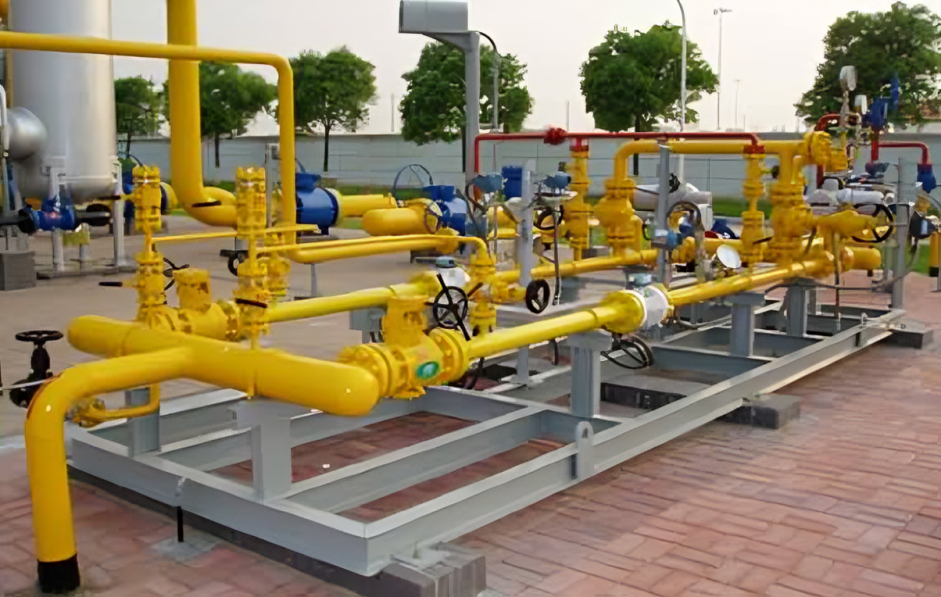Lagos, Nigeria – The Lagos Free Trade Zone (LFTZ) has secured a major investment deal that will boost its industrial capacity and create new economic opportunities for the region. The deal involves the construction of a gas distribution infrastructure that will provide 25 million standard cubic feet per day (mmscuf/d) of natural gas to industries within the zone.
The project, initiated by Optimera Energy, a consortium of three Nigerian gas firms, is expected to be completed and inaugurated by the last quarter of 2024. It aims to address the energy access challenge and high operating costs faced by businesses in the LFTZ.
The groundbreaking ceremony for the project was held on January 9, 2024, at the zone, with the presence of Federal Government officials, including Ekperikpe Ekpo, the minister of state for petroleum resources (gas), and Olu Verheijen, the special adviser to the President on energy.
According to Ekpo, the project is a significant milestone in the country’s journey toward a more sustainable and energy-efficient future. He praised Optimera Energy for its visionary approach and commitment to advancing the nation’s energy landscape.
He said the project reflects the government’s dedication and shared vision for a thriving and resilient Nigeria, powered by its abundant gas resources. He also stressed the importance of collaboration between the public and private sectors for achieving national energy security objectives.
He said the project is not just about pipes and stations, but about powering communities, industries, and dreams. He said it is about creating a foundation for economic growth, job creation, and environmental sustainability.
“It is about making Nigeria an economic giant within the subregion using our abundant gas resources. As we embark on this journey, let us remember the collective responsibility we bear towards shaping a brighter future for our nation,” he said.
Audrey Joe-Ezigbo, the managing director of Optimera Energy, disclosed that the infrastructure is comprised of a 25MMScf/D City Gate Station, scalable to 100MMScf/D. She said the facility would also have the necessary ancillary infrastructure, which includes a 10km distribution line within the zone and a 6.5km x 10 inches gas pipeline from the Escravos – Lagos Pipeline System tie-in point in the Lekki corridor outside the zone to Optimera City Gate Station at the Lagos Free zone.
She revealed that Optimera Energy signed a 20-year Gas Infrastructure Development Agreement (GIDA) with the Lagos Free Zone Company (LFZC) to connect off-takers to their gas distribution infrastructure within the zone.
She said the LFZC has invested over $2.5 billion in building a world-class facility integrated with Lekki Deep Seaport in the Zone, and they are excited to be part of this infrastructural development in Nigeria, particularly as this project is fully aligned with the nation’s Decade of Gas aspirations.
She said Optimera Energy was established to address gaps in energy access while creating sustainable value for its stakeholders. She said they are committed to championing Nigeria’s energy transition to cleaner fuels by leveraging the nation’s abundant natural gas low-carbon resources.
She said they are working to ensure that Nigeria’s natural gas resources are responsibly and efficiently utilized from the upstream and downstream sectors of the value chain. She said their mandate is to execute projects to deepen domestic natural gas consumption and utilization in Nigeria and across Africa.
The development of the gas distribution project in the LFTZ is expected to have positive impacts on the economy, the environment, and society. It will enhance the competitiveness and productivity of industries in the zone, reduce greenhouse gas emissions, create employment opportunities, and improve the quality of life of the people.
The LFTZ is one of the largest and most strategic free trade zones in Africa, covering an area of 830 hectares. It hosts over 40 companies from various sectors, such as manufacturing, logistics, agro-processing, and oil and gas. It is also home to the Lekki Port, which is set to become the deepest and most modern seaport in West Africa.
The LFTZ is a key driver of Nigeria’s economic diversification and industrialization agenda, as it offers a conducive environment for businesses to operate and thrive. With the addition of the gas distribution project, the LFTZ is poised to become a leading hub for gas-based industries and a catalyst for Nigeria’s transition to a gas-powered economy.
Source: BusinessDay



